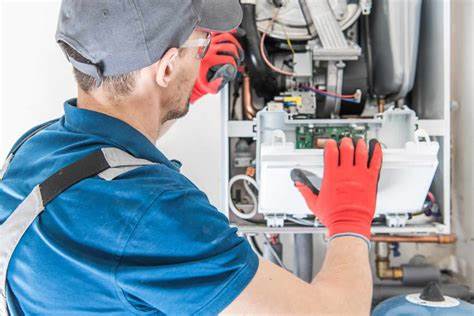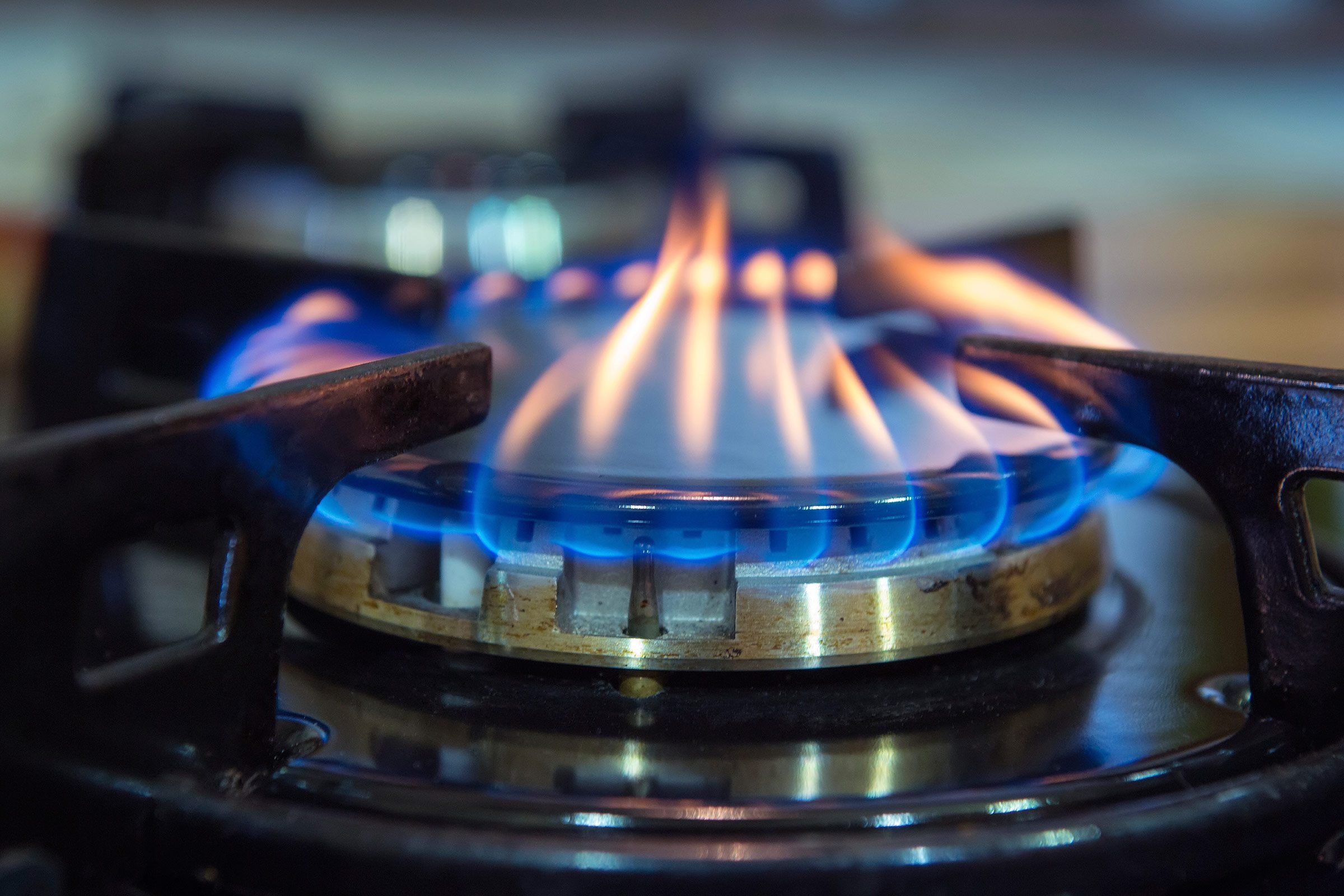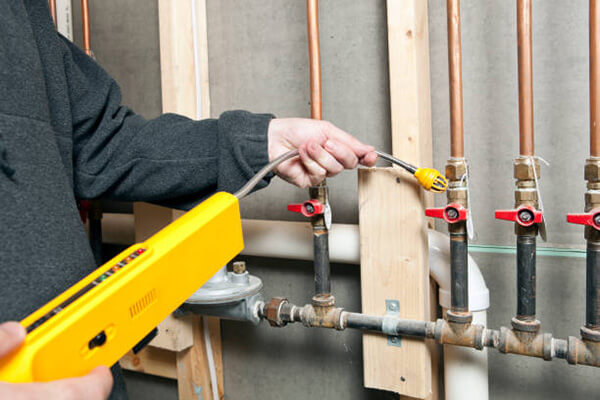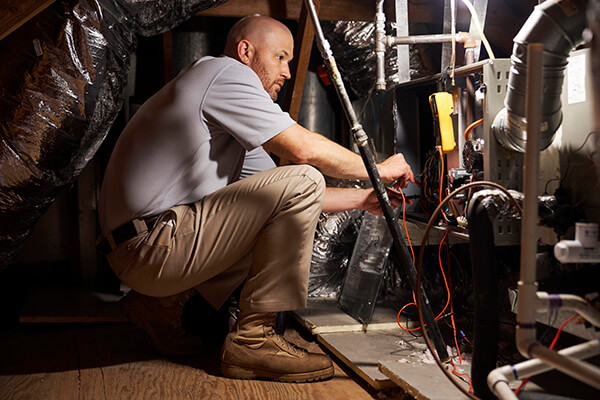Imagine a chilly winter night, your furnace is on full blast to keep you warm and cozy. Suddenly, you notice an unsettling rotten egg smell filling the air. What do you do? The answer could potentially save your life!
Gas leaks from furnaces are not only dangerous but might also cause damage to your home if left unattended. Some homeowners ask “Is it okay to have a gas smell from my furnace?” While this can happen when furnaces need repair, your furnace shouldn’t give off a smell.
This comprehensive guide will teach homeowners how to identify gas leaks, what immediate actions to take when confronted with such a hazardous situation, and preventative measures for keeping your home safe in the future. If you need immediate assistance, contact a local HVAC professional like Anderson Air today.
Identifying a gas leak

source: pinterest.com
To identify a gas leak from your furnace, look out for the unmistakable gas smell from your furnace, a hissing or whistling sound, and a discolored pilot light.
Sulfur-like smell
One of the most common indicators of a gas leak from your furnace is the presence of a sulfur-like smell, often compared to rotten eggs. Gas companies add this distinct odor to natural gas and propane as a safety measure, making it easier for homeowners to detect leaks. Gas smells from furnaces will be cause for concern.
Should you ever encounter this overpowering scent in your home while the furnace is running, do not dismiss it as unimportant or merely unpleasant. A gas leak poses serious risks such as explosions, fires, and carbon monoxide poisoning – all potentially life-threatening situations.
Hissing or whistling sound
If you hear your furnace hissing, it’s essential to act swiftly. It could indicate gas leak, and if left unaddressed, it can lead to dangerous consequences.
A hissing or whistling sound typically indicates that there is a crack in the gas line that is allowing the gas to escape. In some cases, this can also indicate an issue with the furnace’s ignition system.
If you notice this sound coming from your furnace, shut off the gas supply immediately and contact an HVAC technician for emergency repairs.
Discolored pilot light
If you notice that the pilot light in your furnace has changed color, it could be a sign of a gas leak. Normally, a pilot light should burn blue with just a little bit of yellow at the tip.
In this case, turn your furnace and gas supply off immediately and evacuate the building while making sure to ventilate by opening any doors and windows on your way out. Do not touch anything electrical or use any electrical devices until first responders can assess the situation.
It’s important to have an HVAC technician inspect and repair any damage before turning the gas back on to ensure everyone’s safety.
Smell gas from your furnace? Here’s what you need to do

source: pinterest.com
If you notice a natural gas smell coming from your furnace, it is crucial to exit the building as soon as possible and turn off both the furnace and gas supply before calling the gas company or emergency services for help.
Evacuate the building immediately
If you are in your home and you smell gas coming from your furnace system, evacuate the building right away. Gas leaks can be extremely dangerous and potentially fatal if left unaddressed.
Don’t waste any time trying to identify the source of the leak or attempting any repairs yourself – this is a job for professionals equipped with proper safety equipment.
Remember that even if you don’t notice a strong odor, gas leaks can still pose a serious risk.
Symptoms like dizziness, headaches, nausea, or difficulty breathing could indicate that you’ve been exposed to toxic fumes from a gas leak.
So if anything seems off about your furnace or HVAC system in general, err on the side of caution and contact an experienced HVAC technician who can perform necessary maintenance checks and ensure that all parts are functioning safely and efficiently.
Shut off the furnace and gas supply
If you are at home and you smell gas coming from your furnace unit, it is crucial to act quickly and turn off the furnace and gas supply immediately. This will help prevent further damage or potential danger to yourself and your home.
Locate the thermostat of your HVAC system and turn it off as well.
Once the furnace and gas have been turned off, open windows and doors to ventilate your house and let fresh air in. Do not try to locate or fix the problem on your own; instead, call an emergency repair technician who specializes in dealing with gas leaks promptly.
Call emergency services or the energy company

source: pinterest.com
If you start to smell gas coming from your furnace system, it’s crucial to call the gas company or emergency services right away. Don’t wait until it becomes too late before taking action.
Gas leaks can be hazardous and can potentially lead to fires or explosions that could cause severe damage to your home and put you and your family’s safety at risk. When calling for help, provide detailed information about the situation such as whether there is a hissing sound or rotten eggs smell present in the house.
First responders will give you further instructions on what steps to take while waiting for their arrival, including evacuating the building and opening windows to ventilate fresh air in case of high levels of harmful gasses like carbon monoxide that may have built up due to leakages from combustion gasses into living spaces.
Remember that handling a gas leak requires professional intervention from an HVAC technician equipped with specialized tools for repairs; do not attempt any fixes without expert advice.
By being vigilant about potential hazards around gas appliances like furnaces, homeowners can avoid costly damages caused by combustible gasses circulating within indoor environments undetected; This includes regularly checking air vents and filters, ensuring proper storage of flammable items away from heaters or stoves during winter months when usage increases significantly.
Installing carbon monoxide detectors near sleeping areas provides timely alerts necessary for evacuation if dangerous CO levels accumulate unexpectedly.
Preventative measures to avoid gas leaks
Regular furnace maintenance, installing carbon monoxide detectors, and properly storing flammable items are important preventative measures to avoid gas leaks.
Regular furnace maintenance

source: pinterest.com
Regular furnace maintenance is crucial in preventing gas leaks from your furnace. It’s recommended to have an experienced HVAC technician inspect and maintain your gas furnace at least once a year.
During a routine check, the technician can identify any potential hazards, replace worn-out parts, and clean dust or debris that may accumulate in the system.
In addition to professional maintenance, homeowners must also take responsibility for keeping their furnaces safe. Keep the space around the furnace free of flammable materials like paper or chemicals.
Change air filters regularly as dirty filters can restrict airflow leading to overheating and eventually causing damage to the unit.
Carbon monoxide detectors
To prevent carbon monoxide poisoning, it’s important to have a functioning carbon monoxide detector installed in your home. Carbon monoxide is a colorless, odorless gas that can be deadly if not detected early.
These detectors work similarly to smoke alarms and will sound an alarm when levels of the gas become too high.
Many newer models also come with additional features such as digital displays that show the current concentration of carbon monoxide in the air. Regularly testing these devices and replacing their batteries at least once annually can help ensure they are functioning properly and able to provide accurate readings.
Proper storage of flammable items

source: pinterest.com
To prevent gas leaks from your furnace, it’s important to properly store flammable items like gasoline, paint thinners, and cleaning agents. These items should be kept in a well-ventilated area away from the furnace and other gas appliances.
You can also reduce the risk of gas leaks by conducting regular maintenance on your furnace with the help of an HVAC technician. They can take a look at your system for any potential issues and ensure that all components are working efficiently.
Smelling a gas smell from your furnace? Call a professional
In conclusion, a gas leak from your furnace can be dangerous and homeowners should treat it as such. If you notice any signs, leave the building and call your gas company or the emergency services.
Remember to shut off the furnace and the supply of gas before leaving the house. To prevent future leaks, schedule regular furnace maintenance with an HVAC technician and install carbon monoxide detectors in your home.



